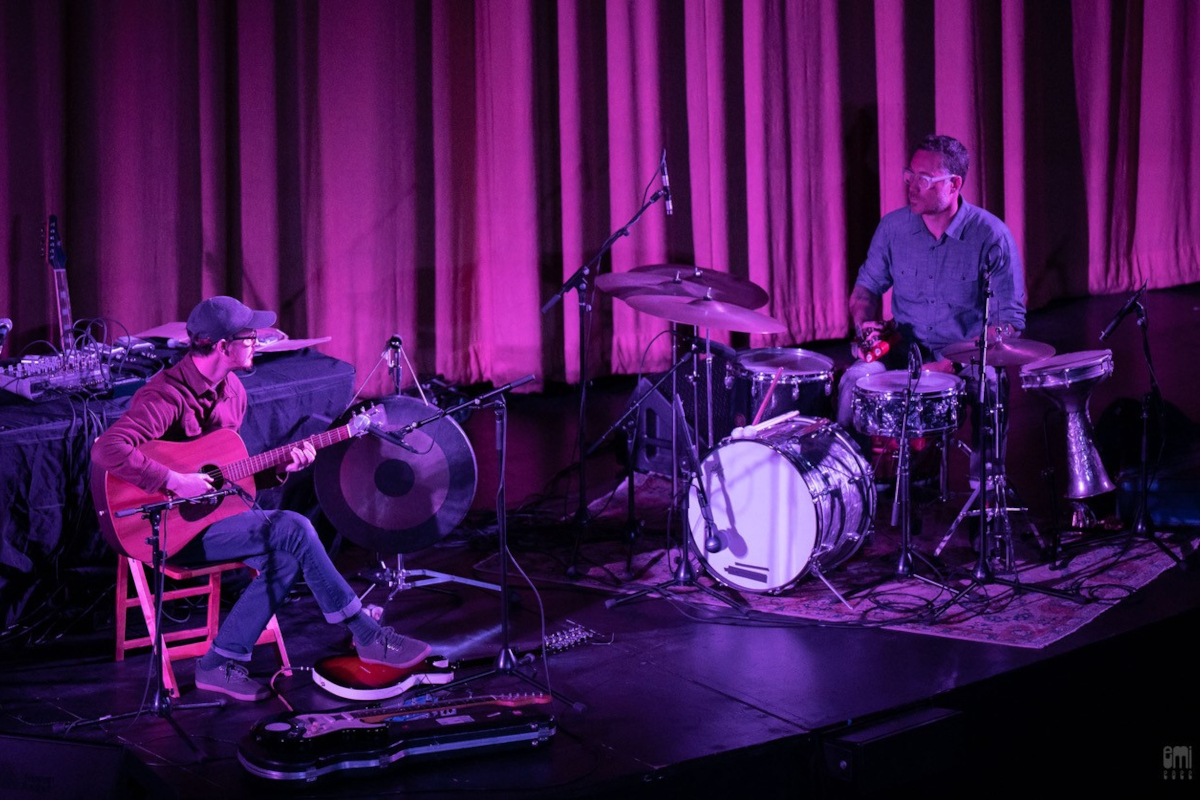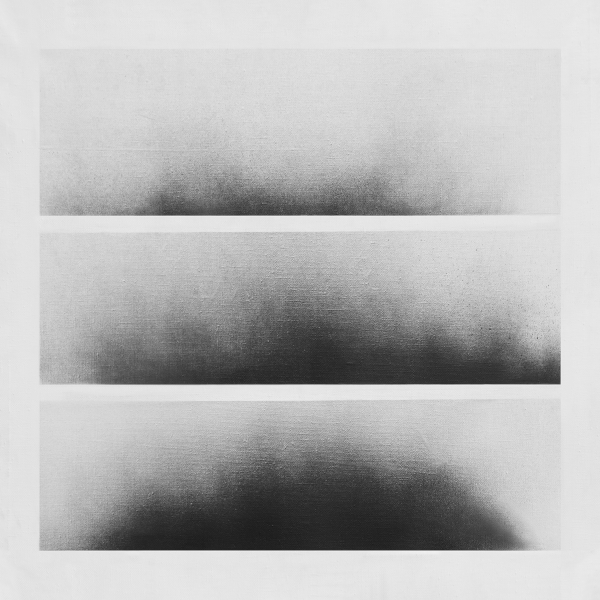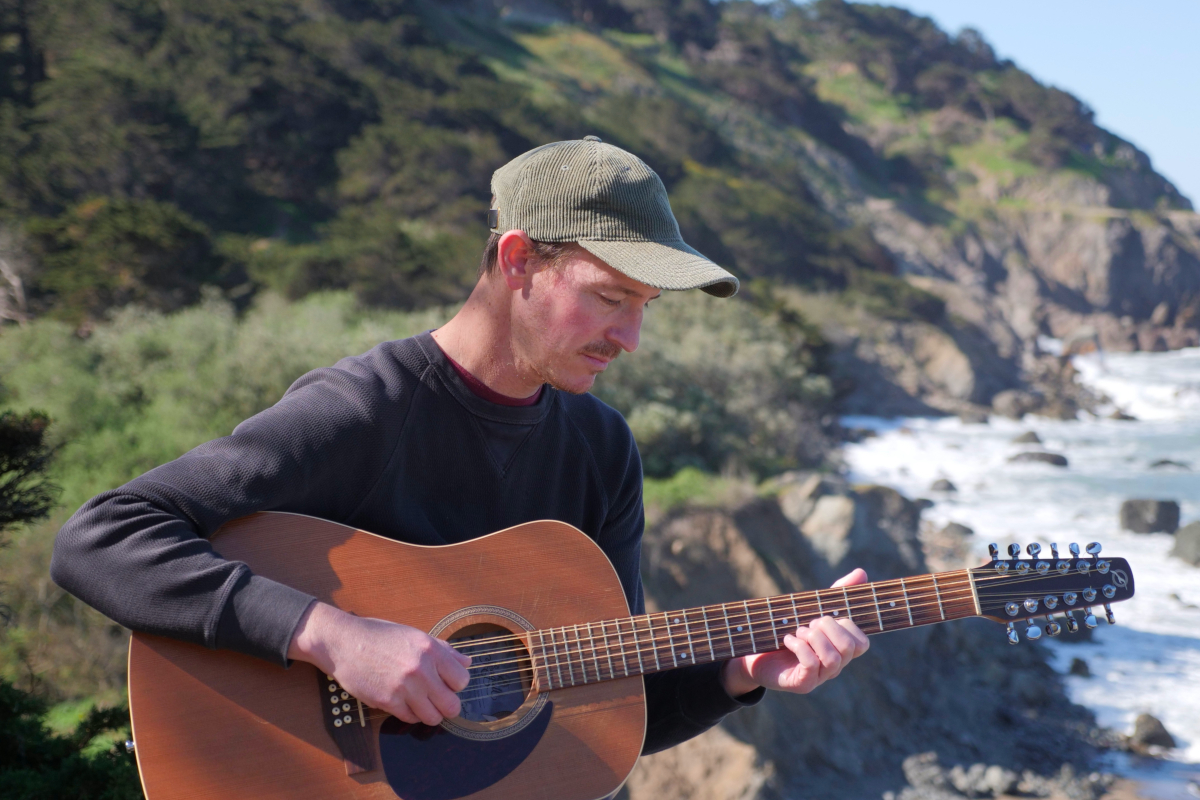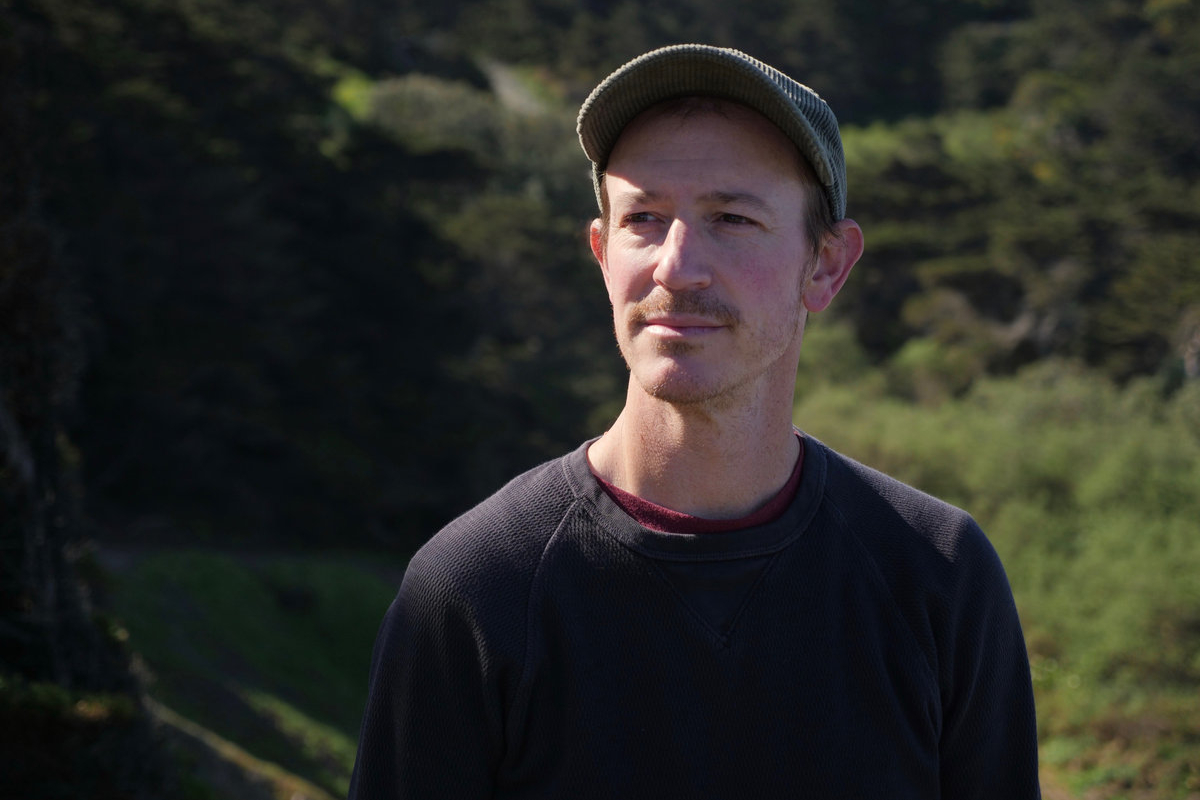Over the past decade, it’s felt like instrumental music has really found its way into the wider collective consciousness. In terms of Americana, the likes of William Tyler, Marisa Anderson and Chuck Johnson have found interesting ways of intersecting improvisation and the quintessential sound of country, evoking the idea of freedom, wide open space, and the possibilities these landscapes can bring.
Guitarist Danny Paul Grody is another who has etched out a similar elusive grandeur, brushing across the strings and creating a warmth like no other in this space.
Previously a part of post-rock underground legends Tarentel, and later the equally vital jazz-influenced collective, The Drift, Grody has spent the last 13 years releasing music under his own name. All told, it’s a truly captivating experience, and for those unfamiliar with his works, it’s well worth the time of disappearing down the rabbit hole.
There’s the beautiful one-two of Fountain (2010) and In Search of Light (2011). The drone-based earworms of Between Two Worlds (2013) and Sketch for Winter VI: Other States (2016). And the Sunday morning serenades of Furniture Music parts one (2014) and two (2021), where Grody has taken his audience on an exquisite journey of simplicity and melody via gently crafted guitar sketches that mirror the modesty of the artist himself.
Which brings us to Grody’s latest offering, Arc of Day. A record with a heavy emphasis on those aforementioned open spaces and the environment, purely through sound Grody manages to capture a locality like never before. Harnessed by collaboration, the guitarist is joined by former fellow Drifters, percussionist Rich Douthit and bassist Trevor Montgomery (also of Tarentel), clarinettist John Sielaff and, indeed, Chuck Johnson, who has toured alongside Grody over the years on the back of their respective releases via Jamestown, North Carolina label, Three Lobed Recordings.
With an album that feels and sounds more ‘band’ orientated, Sielaff’s clarinet and Douthit’s percussion are vital to the beautiful sonic vignettes during Light Blooms, California Angelica and Path to Olema. Meanwhile, the atmospheric meander of Cathedral Tree leads into the multi-faceted, majestic closer in Slow Walk. A slow-building, hypnotic and emotionally-charged epic that is among the finest compositions Grody has given us.
It’s a wonderful finish to Arc of Day, a release which sees Grody adding new layers and dimensions to his songcraft. It’s an exciting progression into new territory, capturing a wholesome sound anchored by his fellow collaborators.
At the end of May via Zoom, we caught up with Grody from his Bay Area home to talk about Arc of Day, the process and inspirations behind the album, his past artistic endeavours, potential new ones, and parenthood.
Sun 13: Can you tell us about the process behind Arc of Day?
Danny Paul Grody: “It really started from wanting to collaborate with other folks again. I had been working solo under my own name for some time and was, I think – with the pandemic and the isolating aspects of being closed in – just craving that collaboration and getting to work with folks again, and expanding some of my own echo chamber of how I work, and methods, and in bringing in new voices; just being connected with other people outside of music. So that was really the impetus for it, and that’s where it all came [from].
“I have a long-time collaborator and friend, Rich Douthit, who is completely seminal in this music. He’s a percussionist, and we used to play in bands together; The Drift was the band that we played in the longest. It had been some time since he’d been behind a kit for various reasons, and so it was an effort to get him back. He’s such an amazing musician. [I] really enjoy playing with him, [and] was feeling like that was something I wanted to work with – more rhythm and percussion. And with him in particular, just the energy that he brings into music is something that’s really special. Getting him behind the kit and getting into a room with another human being.
“Starting there, it wasn’t really like, ‘We’re going to make an album, and it’s going to be the new Danny Paul Grody album’. It was more like, ‘Let’s get into a room and start making some music again together’. As that started to take shape, we both knew that it would be interesting to try and incorporate some of what I’d been doing as a solo musician into maybe a larger vocabulary. It just took form from there.
“As the songs started to flesh out, we realised it would be cool to bring in other members and other collaborators, and it just grew from there. I hesitate to say it’s a pandemic record, because I feel like that narrative is… we’ve heard it. But, it’s true that there’s a huge aspect to the timing of when I started making this music, and how it aligned with the experience of being in that. So that’s a factor, but also just feeling like I wanted to get out of my own echo chamber, and then bring in some other voices into the room and see where it could go and feel stimulated.”

Danny Paul Grody performing alongside Rich DouthitS13: Had the pandemic not happened, would you ever have envisaged your solo albums having such a heavy emphasis on collaboration?
DPG: “I think so. I think it would have happened regardless. I’m not sure how the choices would have differed, because I worked with Rich and I had to have a bassist, and Trevor Montgomery is now based in New Zealand.”
S13: Oh, wow!
DPG: “We did it all remotely. And it was not a problem because Rich, Trevor and I have such a chemistry over the years of working together. In the context of that, The Drift and in various other iterations, it felt quite natural to work that way, because I’ve never really done extensive collaborating remotely, so this was a first for me. I think it was probably inevitable that I would have roped Trevor in, I would have roped Rich in somehow, because they’re just people I will continue to work with, and when I think about expanding the palette, they are of some of the first people that come to mind.
“So then Jonathan [Sielaff], the clarinettist who’s featured heavily on the record, really helped to define and shape the album, is based in Portland, Oregon. So again, remote. Maybe I would have chosen to work with more local musicians had it not been the pandemic, but it’s impossible to answer completely. But again, Jonathan is somebody that I admire so much. He’s one half of a duo called Golden Retriever based up in Portland. I’ve known him for years, seen him perform. He’s just channelled something special, and I’ve always dreamt of finding a way, excuse, or reason. I think if he was willing, I was willing.”
S13: It’s great that you mentioned Rich, because I was only thinking about this earlier today. I was very fortunate to see The Drift in 2008 at the ATP where the Explosions in the Sky curated.
DPG: “Oh my gosh!”
S13: That was that was an unbelievable show. I seem to remember that Trevor wasn’t in the band at the time, but he played as Lazarus before you…. I just remembered Rich and obviously Jeff Jacobs on trumpet as well. You had an upright bass player, too…
DPG: “Safa [Shokrai]”
S13: He was incredible!
DPG: “Yeah. He studied jazz, so he’s got chops. He’s not afraid to go out and explore and be experimental. He was heavenly to work with. He still lives here in the Bay Area; we actually keep in touch. He would like to maybe try and find some opportunities to work again together. I just had a baby, a second baby, so life is full. But yeah, that’s such a cool thing that you were able to be there. And now in my mind, I’m now remembering the room, the stage…”
S13: It was in an interesting time, because I think Memory Drawings was released within a week or two of that show.
DPG: “Oh, wow. [That] makes sense. [We] probably built the tour around the invitation from Explosions. That’s probably what we ended up doing.”
S13: Chuck Johnsons is on Arc of Day, too. How did that sort of collaboration come about?
DPG: “Yeah. Chuck is one of my friends. Again, somebody I deeply admire. Obviously, his musicianship is outstanding and has no boundaries; he’s unafraid to move through different musical spaces and pick up different instruments. We’ve released solo records alongside each other on Three Lobed, so we’ve done some touring in support of those records together. I think that cemented our friendship through those experiences, but even before that, the admiration was there. He’s just such a good guy as a person, too. He’s just such a solid, grounded, humble human being. Like Jonathan up in Oregon, he’s just one of those people that, even though we’ve gotten to share a lot of bills together, he’s somebody I’ve always dreamt of taking it a step further [with] and bridging that gap a bit more.
“So as this was starting to become more and more collaborative, I [thought], ‘I’m going to talk to Chuck and push that idea’. He was open to it. We actually got him in the studio, because he lives here in the Bay Area. He found himself onto one track on this album, but – full disclosure – we recorded two albums worth of material and he’s all over the other material as well. We’re going to be releasing a second part as a second LP that’s more amplified and less acoustic-based. Chuck’s on a lot of that. It was really fun to work together.”

Danny Paul Grody - Arc of DayS13: What was the most important aspect that you wanted to capture with the record? Did you have any preconceived ideas of what you wanted, and did they line up with the finished article?
DPG: “Yeah, I think I wanted to be surprised. I wanted it not to be totally expected. That was something that, just as a creative impetus, was there at the centre of it all; to bring in other voices, familiar voices, and new to me voices. To step away from my own self a bit and be surprised by… if there’s a core idea of a melodic refrain to see what happens against that, and then to let it take on a life of its own. That was something that I was really interested to see where it could go.
“I think I was able to accomplish that I was surprised. I mean, the second single came out today, California Angelica. That tune, I feel like is the perfect example of that. That was one of the earliest pieces Rich and I were working with before the record was even in our consciousness, and when more people started to participate in adding to the song, it took on a completely different shape [and] mood. I love that. That’s what it’s all about when it comes to collaboration, so that was a huge part for me. Also, like I said, just [the] feeling of camaraderie and connection that comes with working with other people. Even if it’s totally your own, someone’s on the other side of the planet. There’s still the sense of someone out there, there’s a call and response, there’s a dialogue happening, and I wanted to feel that again. It was certainly exacerbated by the pandemic, but it was also a longing that was there before the pandemic, and I think it would have been there regardless. So just to feel like you’re in a room with people in some way, in some capacity was another major factor.
“I think you could probably relate to this if you’re musician yourself, but certainly as a listener, just the cathartic aspects of making music; a place of bliss and channel and finding somewhere for all the feelings to land and be articulated. I don’t do too well verbally, I’m not a lyricist, so when I set out to make a record, it’s like, ‘What’s real for me?’ and it’ll come through in some way. Hopefully it’ll feel good and evoke that. I think that was another goal to represent where I was at, so there’s a lot of emphasis on the idea of place on the album, which is consistent across everything I do. It’s been a muse for me, going places, being in my home environment and taking advantage of the landscape. We did a lot of pulling from that thematically, and I had to spend a lot of time out in nature during 2021/22. Those were chances to get out, and that really seeped into the consciousness of this music, and I think with a lot of intention. It’s definitely reflected in the choice of titles and things like that. Lots of nods to where we live, and I hope that comes across.”
S13: That’s interesting because my favourite track is the closing track, Slow Walk. Can you tell us a bit about that song?
DPG: “Yeah. I knew I wanted to get that electric 12-string in the mix, because it was a fairly new acquisition. I was enjoying the idea of it but hadn’t really had a chance to plug it in and play with another person, so this was the absolute perfect setting to do it with Rich. Once I got that guitar there, I started tuning it to the open tunings that I was already working within for the record and translated an acoustic version of it. I had tracked and shared with both Jonathan and Rich, so I just transposed it onto the electric and at first it was a little attached to the acoustic recording, because it was very Rich sounding with the 12-string acoustic. But then with the drums and the sort of bluesy figure and the bassline quality, it was just like, ‘Hey! This is good! We could go the long distance with this one’. I could approach it a little bit differently; start to incorporate loops, layer and build out more of an atmospheric kind of zone that you can’t quite do live with an acoustic guitar in the same way. So, it’s just an opportunity to, not fully consciously, but in some ways return to some of the modes that we’ve worked in with The Drift.”
S13: Interesting. I wouldn’t say that Slow Walk mirrors it, but it gives off the same kind of vibe as some of material on Blue Hour.
DPG: “Yeah. That was really kind of anchored by the instrument. And what happened was, I think, it just naturally brought out that history. That DNA that was already there just came right through. Like an old friend showed up in the room, but age didn’t change, you know? The different sort of thing, but it was cool. I thought, ‘This is a way to really marry what I’ve been doing and what I’ve been interested in’. Bringing a larger palette and a different approach, you know?”
Glass State: In Conversation with Sweet Williams’ Thomas House
S13: Yeah. Talking about that, the one thing I’ve always associated with your work both in a solo capacity and with The Drift is the emotional intensity. Do you put much of an emphasis on that, or do you just leave it for the listener to try and untangle?
DPG: “I think circling to this idea of just having a place to land. Music is that for me. It’s the most pure and unfiltered thing for me to make sense of my emotions and give it a voice. That is what it is: the vessel for me to communicate through. Because of this, it just happens to be what the takeaway is for listener maybe – an interpretation, of course. I’m not here to bang someone over the head with meaning or overly defining. I want it to be very open, and I love instrumental music as a listener for that reason; you can attach your own associations and meaning to it, but there’s also a tone and a mood that plays out that will shape how we relate to the song and what we’re listening to, [and] where we’re listening to it, and where we’re at [in] our state of mind.
“It’s not really like, ‘Oh, I’m gonna make a song that’ll make someone feel very much this one way’. It’s more like a mirror of where I’m at, and if it’s relatable then that, to me, is mission accomplished. If it provides something for another person to attach their own meaning, a way to release or something like that, that’s great, too. It’s not like a lot of preconceived thought goes into it – that is my process, that is a part of who I am as a musician. The extension of the end result is that there’s an emotionality to it, because I’m an emotional person, and I’m not afraid to express that. Music is my best way to do it, and I’m grateful to have it because not everyone has access to it. I’m glad that I have it just for my own mental health, and very grateful to be able to share it to people who care to listen and have their own experiences with it. That’s everything for me.”
S13: Do you work on music every day?
DPG: “Not at the moment.”
(Both laugh)
DPG: “No, the last few weeks, she’s 20 days old now, so all hands-on deck. It’s beautiful, but it’s full on. When the dust settles from something as intense as welcoming a new life, I tend to be pretty consistent in my practice.I’m always having a reason to pick up the guitar or flirt with some idea or build on something. You could say it’s almost a practice. It’s a meditation. A place to go, like a refuge, emotionally. It’s always available. I have guitars in the house, I could just pick it up. I tend to do it on a daily basis, as much as I can. At the moment, not so much, which is hard. “

Danny Paul Grody (photo: Ian Albert)S13: When finishing an album, some artists feel absolute relief, others feel totally lost afterwards. How do you feel?
DPG: “Generally, I feel it kind of got the juices flowing, and I wish that we could have lived in the studio for a month! There’s that hunger that’s there. There’s more to be said, and just having to be patient with that process. I’m really glad that we were able to capture as much as we did, it was a really fruitful session, because we took The Drift approach or even my other former band Tarentel.
“We always went into sessions with the intention to do something to have set aside space to do lots of unplanned recording.That’s built in, baked into the process. Because in our experience on both projects, some of the most exciting work came from those unplanned moments. So that’s what we did, and the result of it was more music than you could put into an album, so we have another album’s worth of music, and that’s why I’m riding off that energy too. To nerd out on sequencing and shaping and mixing, working with new themes with Rich and bringing in potentially different collaborators that I’ve already started conversations with. We even have a timeline, so it still looks like the energy from the session is still resonating. So, I don’t feel a sense of grief or loss or listlessness or anything like that. It’s quite the opposite.”
S13: Regarding state of music today, but also the nostalgic aspects, I think this would apply to Tarentel and perhaps The Drift. These days it’s so hard to make a living, but there’s obviously, I would imagine, reissue opportunities for the Tarentel catalogue and things like that. You’re an artist that has lived through the times where physical product was vital, and you’re still making music in this new era, too.
DPG: “Yeah, it’s interesting. I think you’re touching on a layered, very complex part of what it means to be in the midst of different generations of music and industry. How that shapes listening and consumption, and just the overall experience of what it means to be creating. What it means to be consuming. You and I are probably of a similar generation, pre-Internet, and now into the Internet, so we’ve seen immense change culturally on a collective level, on every level! And music is no exception to it. So, it’s been crazy to be a witness to that and to have participated in it from different sides of it.
“When Tarentel was its most active, I was in my 20s, so I was of that lens; a lot of idealism, a lot of freedom, and willingness to just set aside everything for that. I’m so thankful that I was able to do that, to centre my entire life on this musical collaboration and really dive in and devote myself so fully. To have had the opportunities to put records out, to do the touring, for it to sustain the project. It wasn’t like we were bringing home the bacon, but we were able to sustain itself. And that was enough to sustain me, on a spiritual and creative level.
“There was a period, in my early 20s, where I had to come to terms with the reality that, ‘Okay, I get to do all this amazing stuff, but it’s not necessarily going to translate to a living in a really dependable way’. So, there is this reckoning that I had to process and deal with in my own way, which I think was more indicative of the music that we were making more than the changing landscape of the music industry. But when you talk about this, it does make me think back and appreciate that we had that time and place, that we were able to do it when we did it. Now if we were that band and I was in my 20s, I wonder if the opportunities would have been there, I wonder what the experience would have been like [and] how it would differ.
“I’m so grateful and continue to be grateful that I’m able to keep making music on my own damn terms, without anyone dictating, without the pressure to make a living, just to do it, because I love to do it. Fuck, man, I got someone who wants to put the record out! Living in this day and age, someone wants to put out a physical record! I do get to continue to participate in the world of music in that way, and I do continue to play shows here and there, even as someone who’s in his mid-40s, and a parent and therapist as a mental health worker now.”
S13: That’s great!
DPG: “Yeah, [I] went and got my Masters. Out of that reckoning was the seed to me going back to school and getting a Master’s in Counselling therapy and building that up. So that’s what I’m doing now in conjunction with my music practice. And they’re not mutually exclusive, by the way.”
Arc of Day is out via Three Lobed Recordings. Purchase from Bandcamp.


8 replies on “Light Blooms: In Conversation with Danny Paul Grody”
[…] Light Blooms: In Conversation with Danny Paul Grody […]
LikeLike
[…] Light Blooms: In Conversation with Danny Paul Grody […]
LikeLike
[…] latest, On Garudan Wing, is like a sweeping echo across the same majestic landscapes occupied by Danny Paul Grody and Chuck Johnson. With a woodsy grace and Tortoise-inspired noodlings, LaJoie draws things out, […]
LikeLike
[…] Light Blooms: In Conversation with Danny Paul Grody […]
LikeLike
[…] and tempo shifts that echo the likes of Chris Abrahams and The Necks, those who fell in love with Danny Paul Grody’s Arc of Day earlier in the year can do it all again with Astrïd’s Always Digging the Same […]
LikeLike
[…] InterviewListenPurchase from Bandcamp […]
LikeLike
[…] at full tilt, Meltwater is simply bombastic. Not a world away from the likes of Danny Paul Grody’s most recent works, but with the added force of Branton and Nicholas, Mawdsley never crosses […]
LikeLike
[…] Light Blooms: In Conversation with Danny Paul Grody […]
LikeLike